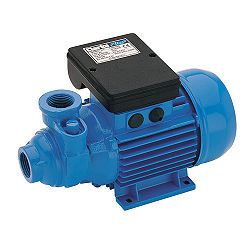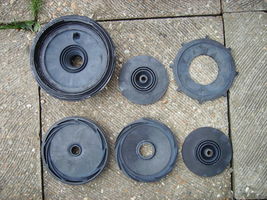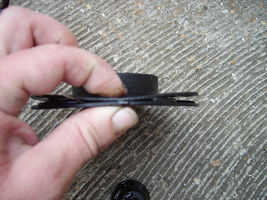Pump - buyers guide
Some guidance on purchasing a centrifugal biodiesel processor pump.
Flow rate
As a rule of thumb, the more flow the better. Increased flow aids mixing, which produces faster reactions and more complete conversion.
However, larger pumps require larger bore pipework, which is more expensive and often harder to fit. They also consume more power - so there is always a trade off.
At the minimum a pump should be chosen to turn over the batch volume in a few minutes. Typically a TAM105 at 40lpm can turn over a 160l batch (192l with Methanol) every four and a half minutes.
However, small pump performance can be improved with an eductor or by following the two stage process.
Closed or open impeller
Centrifugal pump impellers come in two types, closed or open.
Smaller pumps such as the TAM105 have an open impeller - the fins of the pump are a tight fit to the pump casing, and "shear" the liquid as it passes through. This has the advantage that burnt crispy bits in the oil do not jam the pump, but get mashed on the way through. The disadvantage is that anything in the liquid that is harder than the pump impeller will cause damage.
Larger pumps (typically 80 lpm or higher) usually have closed impellers. Two disks of material sandwich the impeller fins and turn as a single unit. This allows greater structural integrity for the larger diameter impellers needed for greater flow. The disadvantage is that large lumps will just jam in the impeller, turning with it and restricting flow. Any fibrous material in the oil (usually bits of meat) will collect on impeller sharp edges. Fortunately, harder debris in the oil are unlikely to damage this kind of pump.
Multistage pumps
Multistage pumps put two or more impellers in series, driven by the same motor shaft. Each stage feeds the next. This acts to increase the flow if the pump outlet is restricted, so this kind of pump is excellent for driving eductors and venturis.
Materials
Most common water pumps come fitted with Noryle/PPO/technopolymer impellers, which are often a blend of Polyphenylene Oxide and Polystyrene. These impellers are suitable for cold oil transfer, but not up the job of mixing oil with alkali catalyst and Methanol in the presence of heat, as can be seen in the gallery below.
Look for a pump which has brass or stainless steel impellers.
When selecting a multistage pump, although the impellers may be stainless, the diffuser between stages may not be. Check the datasheet.
In addition on multistage pumps, the sealing material (on datasheet diagrams shown as "wear ring" or "stage ring") between each stage is often EPDM which expands with oils, eventually binding and stalling the pump. So care must be taken when selecting this kind of pump for biodiesel equipment. Look for Teflon, Nylon or metal wear rings.
- PPO impeller failure on biodiesel processor





